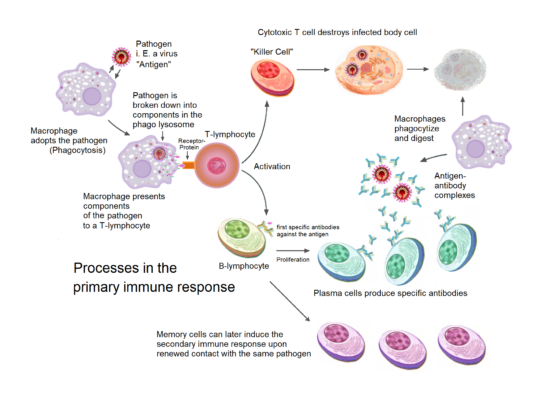Strengthen Your Immune System with Positive Thinking and Mindfulness

Are you a glass-half-full kind of person? If you are, you may have a healthier immune system than some.
Your immune system plays a critical role in keeping you safe from illness and disease. A healthy immune system fights off infections, but a weak immune system will be more prone to infections and disease. When it comes to improving and protecting your immune system, you probably think of taking Vitamin C or eating more greens. But did you know that your mental health plays a significant role in your physical immune health? Moreover, a positive outlook on life can improve your immune system.
The power of positive thinking is more than just an inspiring saying. It is, in fact, very real. Science backs the remarkable power of positive thinking and mindfulness to reduce stress, improve energy levels, and even improve your overall health and immune system.
But is it as easy as thinking happy thoughts, or is there a method to improving your immune system through positive thinking?
Understanding Positive Thinking

Positive thinking goes beyond the occasional confidence-boosting thought or self-encouragement. Psychologically speaking, positive thinking is the practice of focusing on the positive in life. It is, at its core, a lifestyle choice and variation of mindfulness – a psychological practice dedicated to focusing awareness of the present moment.
The conceptual core of positive thinking has existed since ancient times. For example, the philosopher Epictetus lived during the reign of Emperor Hadrian (117-138 A.D.) and shared the belief that it is within our power as humans to control our thinking and achieve a positive outlook on life. In his words, “This is the proper goal, to practice how to remove from one’s life sorrows and laments, and cries of “Alas” and “Poor me,” and misfortune and disappointment’ (Discourses 1.4.23, trans. Dobbin).
The philosophy of positive thinking has evolved over time. The most recent iteration first developed in the 19th Century in the “New Thought” era, referred to by contemporaries as the ‘religion of healthy mindedness.
As the psychological study of positive thinking has grown over the years, science has discovered the practice holds many benefits for practitioners.
Benefits of Positive Thinking

Image by Gerd Altmann from Pixabay
The practice of positive thinking has been scientifically linked to improved mental, physical, emotional, and immune health.
Mental Health
Studies show that positive thinking mindfulness techniques can help improve anxiety, depression, and addictive disorders in practitioners. With consistent practice, research showed promising results in preventing relapses in subjects diagnosed with depression.
Improved Stress Management
Research indicates that alongside physical and mental health benefits, stress levels tend to reduce in practitioners of positive thinking and mindfulness. The reduction in stress plays a key role in the increased physical health of practitioners.
Physical Health
The Mayo Clinic attribute multiple physical health benefits to mindfulness and positive thinking. Benefits include reduced risk of heart attack, lower levels of pain, and a longer lifespan. In addition, studies indicate that mindfulness practices can reduce stress-related disease outcomes in individuals suffering from diseases such as psoriasis, post-traumatic stress disorder, and HIV.
Image byGerd Altmann fromPixabay
How Positive Thinking Impacts the Immune System

The immune system suffers in periods of prolonged stress. Studies have shown that prolonged or excessive stress dampens the immune system, reducing the number of cells available to fight off infections and reducing the body’s anti-inflammatory processes by producing too much of the stress hormone cortisol. The impact of stress on the immune system is quite powerful – stress can influence the type of immune cells produced in the body, including cells that promote cancerous tumor growth in the body.
Positive thinking can help reduce stress and reframe the mind to seek positivity consistently, which consistently reduces stress in practitioners.
Exploring Mindfulness
Mindfulness and positive thinking are interlinked and, in some ways, the same thing. Positive thinking is the conscious choice to frame life experiences as positive. Similarly, mindfulness is the psychological practice of staying grounded in the present moment and reaching total awareness of our thoughts, emotions, and bodily experiences. Both are practices requiring conscious choice.
Mindfulness has existed as a practice for thousands of years – variations of it exist in Judaism, mysticism, and Hinduism. What we view as “mindfulness” today grew in popularity in the late 20th Century and most closely resembles the Buddhist practice of meditation.
Mindfulness is essential to positive thinking because practicing mindfulness develops the skill to analyze and become aware of your emotions, stress, and physical responses to any given moment. It is the cornerstone to recognizing when you are being negative so that you can, in turn, reframe the moment with positive thinking.
Benefits of Mindfulness

Mindfulness shares many of the same benefits as positive thinking:
Enhanced Self-Awareness
Mindfulness develops a deeper awareness of your thoughts, physical reactions, and emotions.
Reduced Stress
Studies show that mindfulness can positively impact stress levels. Mindfulness can help reduce blood pressure, improve sleep, and reduce the physical symptoms of stress like irritability and fatigue.
Improved Emotional Regulation
Mindfulness gives you the power to control your mind instead of your mind’s impulses controlling you. It gives you a space to recognize your emotions and practice regulation in even the most stressful moments.
How Mindfulness Impacts the Immune System
Mindfulness impacts the immune system in much the same way as positive thinking – it helps improve the immune system. Mindfulness can reduce the production of cortisol in the body, thereby encouraging the immune system’s anti-inflammatory response.
The Science Behind the Stress Connection

A healthy level of stress is good for the body. Research by UC Berkley found that short-term stress can improve alertness, performance, and memory. But long-term stress, on the other hand, can significantly hamper the immune system.
In recent years, the study of psychoimmunology has paved the way for researching the connection between the mind and the immune system. Psychoimmunology studies how neurocognitive processes control the immune system and, in turn, how the body’s immune processes impact neural, cognitive-emotional, and behavioral outcomes. Research findings indicate that psychological stress and immune function are closely intertwined. When the brain experiences cognitive or emotional stress, it triggers stress signals that, in turn, trigger the release of cortisol.
The immune system relies on healthy levels of cortisol to reduce inflammation in the body. However, chronic excessive cortisol causes the body to adapt, tricking it into thinking it needs that higher level of cortisol. As a result, the body becomes more receptive to increased inflammation. Additionally, chronic stress can cause a decrease in white blood cells. As a result, the immune system weakens and cannot fight infections efficiently.
Positive Thinking Techniques

Incorporating positive thinking techniques into your daily life can help reduce your stress levels and improve overall wellness. Common positive thinking techniques include:
- Affirmations: Affirmations are a form of self-talk in which you encourage yourself (out loud or in your head) with positive thoughts. For example: I can do this project. I deserve to be loved. I am a confident person.
- Visualization: The human mind has a powerful imagination. Visualization uses the imagination to picture a positive outcome.
- Cognitive Restructuring: Cognitive restructuring is the practice of changing the way you think. During the exercise, you identify moments of stress and analyze your reaction to them – ask yourself, why does this stress me out? Is my reaction valid? You then seek a more balanced reaction to the event based on your analysis.
- Surrounding Yourself with Positivity: As the saying goes, “What goes in must come out.” If you fill yourself with negativity, that is what your brain will automatically turn to. Surround yourself with positive people and a positive environment to encourage your positive mindset.
Mindfulness Techniques

Mindfulness techniques work well in combination with positive thinking. When practicing a mindfulness technique, try applying a positive thinking technique alongside it. Common mindfulness techniques include:
- Breath Awareness: Take a moment and check in with your breath. Slow your breathing and pay attention as the air rushes in and out of your body. Breath awareness can help reduce stress and encourage relaxation no matter where you are.
- Body Scan: Throughout the day, check in with your body. Mentally relax each part of your body from the toes up, consciously feeling the sensation of each muscle flexing and relaxing. A body scan is a cognitive form of meditation that can reduce stress and muscle pain while improving body awareness.
- Mindful Eating: Mindful eating not only helps you savor your food, but it can also help you relax. By focusing entirely on each bite you take, you encourage your body and mind to exist in the present moment, free from stressors around you.
- Walking Meditation: Walking meditation encourages you to focus on an everyday activity as a form of meditation. During walking meditation, you choose to analyze each step, deeply breathing as you walk and finding a deeper connection with your physical body.
Integrating Positive Thinking and Mindfulness into Daily Life
It’s not difficult to integrate positive thinking and mindfulness into your everyday life. A successful relationship with both practices begins with small steps and a routine.
Step 1: Creating a Routine
Start by selecting specific times to practice mindfulness and positive thinking. You can set reminders for times throughout the day, whether it’s on your lunch break, every hour, or once a day, etc. Follow your routine, and eventually, the practice will become a reflex.
Step 2: Make Small Changes
Small changes make the biggest impact. Trying to make a drastic life change instantly will overwhelm most people. Instead, choose a single exercise or a short length of time to practice mindfulness or positive thinking, and as you grow more comfortable in practice, extend the duration or add more exercises to your routine.
Step 3: Establish a Supportive Environment
This step goes back to surrounding yourself with positivity. Let your friends and family know you are seeking a more positive outlook on life – ask them to support you in the goal. Surround yourself with positive people. Listen to positive music. Watch happy tv shows. Simple changes like this can encourage and develop a supportive environment for positive thinking.
Overcoming Obstacles and Challenges
Mindfulness and positive thinking are mental muscles that need strengthening. Sometimes, those muscles will fail, weaken, or need a break. And that’s okay. Challenges come up with any lifestyle choice; you just know how to address them when they come up.
Common roadblocks you’ll find when seeking to change your thinking range from having a stressful day at work to suffering from an illness. When life gives you lemons, sometimes you just want to throw the lemons away. But it’s these moments of negativity that you should embrace as an opportunity to grow. After all, how can you find the positive side of things if a negative one doesn’t exist?
But, there are times when negativity can overwhelm even the best mindfulness practitioners. In these instances, it’s okay – encouraged, even – to seek professional help. A therapist can guide you through your practice, giving you new tools and support to rebuild your positive outlook.
Real-life Success Stories
The power of positive thinking may sound like a bedtime story, but the proof is out there. Success stories from cancer survivors, athletes, and students – normal people achieving success in mindfulness and positive thinking.
One Georgia State Law student experienced a drastic improvement in her anxiety levels, increased focus, and improvement in her academics. Tatiana Pasada described her journey in the Georgia State New Hub.
In the wake of COVID-19, many adults suffered from anxiety and depression. COVID-19.org collected their mindfulness and positivity success stories for others to read. People like Juliet Tompkins reported that affirmations helped “brighten moods” and “bring more positive vibes” into their lives.
Jeff Vrabel, a writer published in GQ and Success Magazine, admitted to not having a positive outlook on life in his article ‘What I learned Form 30 Days of Positive Thinking.’ He explained his journey to build a more positive life and its positive impact on his emotions and finding value in his life.
Others have faced health adversities with positive thinking. One HIV patient told the NY Times that joining a study researching positivity helped him become “more positive, more compassionate, and I’m now healthier than [he’d] ever been.”
Lessons Learned and Tips for Success
From these stories, we can find two common lessons learned – positivity takes patience, and mindfulness practices look different for everyone.
When starting your positive thinking journey, treat yourself with compassion. Recognize that you may struggle from time to time with your practice. And most importantly, find a mindfulness and positivity technique that feels right for you. Don’t be afraid to try new techniques until you find the right fit.
The Future of Positive Thinking and Mindfulness in Healthcare

Science continues to research mindfulness and positive thinking. In recent years, studies have pondered the application of positive thinking to help those with HIV, cancer, or other chronic illness improve their life. Research indicates that these practices can help patients improve their longevity, reduce stress levels, lower inflammation, and improve the immune system.
As more studies apply positive thinking, integrative medicine has begun applying positive thinking and mindfulness as a holistic approach to patient well-fare practices. The integration of such practices has only grown as technology rises to meet it – wellness apps, videos, and online classes have made positive thinking more accessible to the public. One thing is for sure – positive thinking and mindfulness aren’t going anywhere.
Summary
Looking on the bright side can, quite literally, change your life. Science has proven that there’s real power in thinking positively. Choosing to practice mindfulness and positive thinking can improve your immune system, reduce your stress, and improve your outlook on life.
Frequently Asked Questions (FAQs)
How long does it take to see results from positive thinking and mindfulness?
Positive thinking takes practice. Like any habit, it takes several weeks before positive thinking becomes a reflex. Most studies indicate it takes up to ten weeks to create a permanent lifestyle change.
Can positive thinking and mindfulness replace traditional medical treatments?
Whether positive thinking and mindfulness can replace medical treatment is up for debate. Usually, the practices are used in tandem with medical treatment. But, for individuals suffering from anxiety or depression, studies indicate that mindfulness can sometimes work as effectively as medication.
What are the best resources for learning more about positive thinking and mindfulness?
There are many excellent resources out there for learning more about positive thinking and mindfulness. If you are seeking local help, consider reaching out to a therapist or counselor in your area. You can also check out online resources like Mindful.org, apps like HeadSpace, or Youtube for videos guiding you through mindfulness practices.
How can I maintain my practice during challenging times?
When challenging times arise, it becomes all the more important to practice mindfulness and positivity. When times grow challenging, try setting aside dedicated time to practice mindfulness and self-care. And always remember, it’s okay to reach out for support from a professional, your family, or friends.
Sources
American Psychological Association. (n.d.). Mindfulness meditation: A research-proven way to reduce stress. American Psychological Association. Retrieved April 13, 2023, from https://www.apa.org/topics/mindfulness/meditation
Bcrf. (2020, December 11). Using mindfulness to reduce stress and strengthen your immune system. Breast Cancer Research Foundation. Retrieved April 13, 2023, from https://www.bcrf.org/blog/using-mindfulness-reduce-stress-and-strengthen-your-immune-system/
Black, D. S., & Slavich, G. M. (2016, June). Mindfulness meditation and the immune system: A systematic review of randomized controlled trials. Annals of the New York Academy of Sciences. Retrieved April 13, 2023, from https://www.ncbi.nlm.nih.gov/pmc/articles/PMC4940234/
Bone, M. and J. T. (2023, March 16). What happens when your immune system gets stressed out? Cleveland Clinic. Retrieved April 13, 2023, from https://health.clevelandclinic.org/what-happens-when-your-immune-system-gets-stressed-out/
Brody, J. E. (2017, March 27). A positive outlook may be good for your health. The New York Times. Retrieved April 13, 2023, from https://www.nytimes.com/2017/03/27/well/live/positive-thinking-may-improve-health-and-extend-life.html
Danese, A., & J Lewis, S. (2016, September 15). Psychoneuroimmunology of early-life stress: The hidden wounds of childhood trauma? Nature News. Retrieved April 13, 2023, from https://www.nature.com/articles/npp2016198
Duyse, M. V. (2020, March 30). Boost your immune system with positive emotions. Medium. Retrieved April 13, 2023, from https://medium.com/live-your-life-on-purpose/boost-your-immune-system-with-positive-emotions-ff82ccb294fd
Epictetus (55–135 C.E.). Internet encyclopedia of philosophy. (n.d.). Retrieved April 13, 2023, from https://iep.utm.edu/epictetu/
Examples of cognitive restructuring. Concordia University. (2020, March 4). Retrieved April 13, 2023, from https://www.concordia.ca/cunews/offices/provost/health/topics/stress-management/cognitive-restructuring-examples.html#:~:text=Cognitive%20restructuring%20is%20a%20technique,that%20do%20not%20produce%20stress.
Klfisher. (2021, November 22). History of mindfulness. Human Resources. Retrieved April 13, 2023, from https://www.clarku.edu/offices/human-resources/2021/11/22/history-of-mindfulness/
Mayo Foundation for Medical Education and Research. (2022, February 3). How to stop negative self-talk. Mayo Clinic. Retrieved April 13, 2023, from https://www.mayoclinic.org/healthy-lifestyle/stress-management/in-depth/positive-thinking/art-20043950
Mental health and mindfulness: Success Stories · Covid-19 Archive. Share Your Story · A Journal of the Plague Year · Covid-19 Archive. (n.d.). Retrieved April 13, 2023, from https://covid-19archive.org/s/archive/page/mental-health
Morey, J. N., Boggero, I. A., Scott, A. B., & Segerstrom, S. C. (2015, October 1). Current directions in stress and human immune function. Current opinion in psychology. Retrieved April 13, 2023, from https://www.ncbi.nlm.nih.gov/pmc/articles/PMC4465119/#:~:text=Cortisol%20is%20ordinarily%20anti%2Dinflammatory,the%20immune%20response%20%5B18%5D.
NYAS Publications – The New York Academy of Sciences – Wiley Online Library. (n.d.). Retrieved April 13, 2023, from https://nyaspubs.onlinelibrary.wiley.com/doi/abs/10.1111/nyas.12998
Oxford Handbooks Online . (2019). Oxford handbooks online – stress. The Oxford Handbook of Stress and Mental Health. Retrieved April 13, 2023, from http://www.uclastresslab.org/pubs/Slavich_Psychoneuroimmunology_OxfordHandbook_in%20press.pdf
A positive outlook may be good for your health – New York Times. (n.d.). Retrieved April 13, 2023, from https://www.nytimes.com/2017/03/27/well/live/positive-thinking-may-improve-health-and-extend-life.html
The power of positive thinking. The Power of Positive Thinking | Johns Hopkins Medicine. (2021, November 1). Retrieved April 13, 2023, from https://www.hopkinsmedicine.org/health/wellness-and-prevention/the-power-of-positive-thinking
Thornton, L. M., & Andersen, B. L. (2006, April 30). Psychoneuroimmunology examined: The role of subjective stress. Cellscience. Retrieved April 13, 2023, from https://www.ncbi.nlm.nih.gov/pmc/articles/PMC2473865/
Walking meditation (greater good in action). Greater Good In Action. (n.d.). Retrieved April 13, 2023, from https://ggia.berkeley.edu/practice/walking_meditation
Web. (2022, September 25). How does stress affect the immune system? UMMS Health. Retrieved April 13, 2023, from https://health.umms.org/2020/11/10/stress-immune-system/

